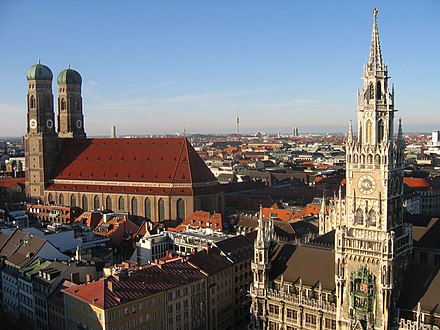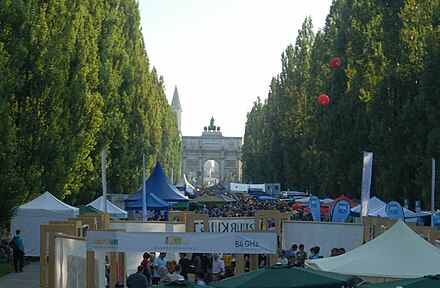Munich - capital and most populous city of Bavaria, Germany
Munich (German: München, Bavarian: Minga) is the capital of the federal state of Bavaria in the south of Germany. Within the city limits, Munich in 2021 had a population of just under 1.5 million, the third most populous city in Germany. Greater Munich including its suburbs had a population of 2.6 million. The Munich metropolitan region which encompasses cities such as Augsburg and Ingolstadt had a population just under 6 million.
Standing on the river Isar in Southern Bavaria, it is famous for its beautiful architecture, fine culture, history and the annual Oktoberfest beer festival. Munich has a thriving cultural scene and striking architecture. It was heavily damaged by Allied bombing during World War II, but many of its historic buildings have been rebuilt, including its largest church, the Frauenkirche, and the City Hall. Other big draws are its sports events, zoo and trade exhibitions.
Munich is a global centre of engineering, science, innovation, and research, exemplified by its two research universities, a multitude of scientific institutions, and world-class technology and science museums like the Deutsches Museum and BMW Museum. It's is a major centre of art, finance, publishing, culture and media, education and business. Its economy is also based on high-tech, automobiles, the service sector and creative industries, as well as IT and biotech. It enjoys a very high standard and quality of life. Munich is one of the most prosperous and fastest growing cities in Germany.
Districts
Munich is divided into 25 administrative districts, but these don't always match "natural" neighbourhoods or make sense to travellers. It's therefore convenient to divide it into the "travel districts" set out below. Most of the key attractions are in Altstadt and Maxvorstadt; the districts of Ludwigsvorstadt-Isarvorstadt and Haidhausen are major night-life spots. The other areas, while mostly residential, feature some hidden gems which are worth a visit.
The city centre with a pedestrian zone that is one big shopping street, and the majority of Munich's most famous travel sights around Marienplatz.
The Brain of Munich with a relaxed and studenty atmosphere, which is home to most attractions that aren't in the city centre, including the world famous galleries Pinakotheken, along with cozy cafés and bars and several universities.
Night-life area immediately south of the centre, home to many cafés, restaurants, bars, clubs and theatres, hotels and hostels, and the focal point of Munich's gay scene. Here find Munich Central Station, the Oktoberfest grounds and, last but not least, the Deutsches Museum, the world's biggest museum of science and engineering
Around the station Munich East, to which Europe's largest contiguous party area Kultfabrik & Optimolwerke draws tens of thousands of people every weekend.
The Northern part of Munich is full of parks, gardens and relaxation areas. It includes the district of Schwabing, dominated by 19th-century architecture and the famously expansive English Garden, the park and palace of Nymphenburg, the Olympiagelände (site of the 1972 Olympic Games) with the BMW Welt and the Allianz Arena in the far north end.
A mostly residential area with an upmarket neighbourhood to the north, a working-class neighbourhood and the Bavaria Film Studios to the south, the Munich trade fair grounds in the east, and the Flaucher beaches along the east side of the river Isar in the west.
Scarcely populated in the west and mainly residential area in the south, with the main attractions Munich Zoo and the Flaucher river islands lying in the east of the area along the river Isar. "Westpark" offers a place to relax with several Asian gardens and an alternative outdoor cafe next to a little lake with frequent live music acts.
Understand
- Tourist information, Neues Rathaus, Marienplatz, +49 89 233 96500, tourismus.gs@muenchen.de. M-F 10:00-18:00, Sa 10:00-17:00, Su 10:00-14:00. The official tourist office is in New Town Hall and can make bookings for tours, hotels and events. 2022-12-04
History
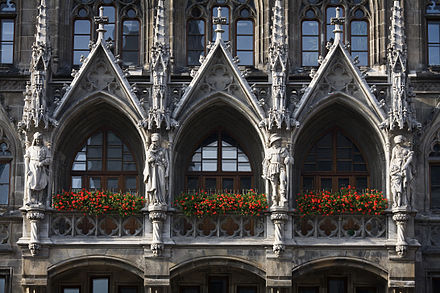
When the last Ice Age retreated 12,000 years ago, it dumped gravel and silt across this area, leaving a heath that was well-drained and suitable for grazing, but not particularly fertile. Munich like other German cities has been settled from prehistory, but by convention the "founding date" is taken as the first documentary mention. That came in 1158 in a document signed in Augsburg, at a time when Munich was just a bridge over the Isar controlled by monks - hence the monk on the city coat of arms. Henry the Lion built a rival bridge so the highway became re-aligned and the town grew rapidly. In 1175 Munich was awarded city status and built its first defensive walls. But Henry fell out with the ruling Staufer dynasty, whereupon Otto I Wittelsbach became Duke of Bavaria (his descendants ruled here until 1918), while Munich was handed over to the Bishop of Freising. In 1255, when an inheritance split the Duchy of Bavaria, Munich became the ducal residence of Upper Bavaria. The late 15th century saw a revival of Gothic arts: the Old Town Hall was enlarged, and Frauenkirche cathedral was built.
The Bavarian statelets were re-united in 1506 with Munich as capital. That meant patronage and prestige, but also politicking, intrigue and shenanigans. The city became a centre for Renaissance arts and for the religious counter-reformation: the Catholic League (an alliance of princes within the Holy Roman Empire) was founded here in 1609. The northern superpower was Sweden until the rise of Russia, and in 1632 during the Thirty Years' War Swedish troops occupied Munich. Bavaria industrialised from the late 18th century but during the Napoleonic Wars Bonaparte brushed aside Bavarian and Prussian resistance, consolidated small duchies, and placed puppet rulers on their thrones. The Wittelsbachs were wily enough to be enhanced by this, with Bavaria promoted to a kingdom incorporating Franconia, and wilier still to rule on while Bonaparte fell, rose again then finally fell. King Ludwig I went on a ruinously expensive building spree to turn the city into an artistic and cultural showcase, best seen today at Kunstareal. The revolutions that roiled Europe in the 1840s ousted Ludwig and his favourite dancing-girl yet still the dynasty clung on.
The 19th century saw the unification of Germany, predominance of Berlin and waning of royal power before secular leaders especially Bismarck. Germany's defeat in 1918 led to tumult, and the Bavarian royal family fled, overthrown by the Bolshevik Kurt Eisner. He in turn was soon assassinated and his "Soviet Republic" crushed. The assassin had to be released from jail in 1924 when the cells became overcrowded; his bunk was taken by a similar right-winger called Adolf Hitler, jailed for the 1923 Munich Beer Hall Putsch against the Weimar Republic. This man hunkered down in his cell and wrote a best-seller which made him wealthy: Mein Kampf.
Munich was thus the stronghold of the National Socialist Workers Party (NSDAP) in the years when few knew of it, and when those few fatally underestimated its raw appeal to a populace embittered by the surrender terms and the 1920s Great Depression. The Nazis gained national power in 1933 and promptly created their first concentration camp at Dachau, 15 km northwest of the city. The 1938 Munich Agreement was the other European nations' last attempt to avoid war, ditching their accords with Czechoslovakia to accede to Hitler's invasion. "Munich" remains to this day a political jibe against appeasement. Churchill wrote "England has chosen shame, and will get war." It soon came. In 1942 / 43 Munich was the base of White Rose (Weiße Rose) resistance movement, little more than half-a-dozen students distributing anti-government leaflets. They were convicted of treason and guillotined.
By 1944 the Allied advance brought Munich within air range and it was heavily bombed. Reconstruction took decades. One milestone was the 1972 Olympic Games in Munich - the infrastructure legacy was the construction of the S-Bahn and U-Bahn, and the fine Olympia park. But the Games were a disaster, as Palestinian terrorists took Israeli Olympic athletes hostage, the response was botched throughout, and all the hostages were killed.
 Post-war Munich shared the ups and downs of Germany, boosted by re-unification of the country and by membership of the European Community / Union, but impeded by the rundown of traditional industries, financial turmoils, and nowadays the effects of Covid and the war in Ukraine. Housing is in short supply so rents are astronomical. City politics are dominated by the centre-left SPD, at odds with Bavaria which is held by the right wing CSU - however they've combined forces to shovel federal and European funding in this direction, to the chagrin of other cities. Green politics are gaining traction and there is much to be done to make Munich a more sustainable city.
Post-war Munich shared the ups and downs of Germany, boosted by re-unification of the country and by membership of the European Community / Union, but impeded by the rundown of traditional industries, financial turmoils, and nowadays the effects of Covid and the war in Ukraine. Housing is in short supply so rents are astronomical. City politics are dominated by the centre-left SPD, at odds with Bavaria which is held by the right wing CSU - however they've combined forces to shovel federal and European funding in this direction, to the chagrin of other cities. Green politics are gaining traction and there is much to be done to make Munich a more sustainable city.
Economy
The economy of Munich along with West Germany rebounded strongly after the Second world War, partly thanks to US investment - with two neighbouring countries under communism and a third teetering, it could not be left to the wolves. Berlin came to the fore after reunification but Munich remains a German economic powerhouse, with six out of the 30 companies on the blue-chip DAX index headquartered here. These include luxury car maker BMW, electrical engineering giant Siemens, the world's largest insurance company Allianz, and Munich Re a world leader in insuring insurance companies. The city's eastern Messe is an enormous complex of trade display halls.
The Munich region is a centre for aerospace, biotechnology, software and service industries. As the largest publishing city in Europe, Munich is home to Süddeutsche Zeitung, one of Germany's largest and most influential daily newspapers. Germany's largest commercial TV network Pro7-Sat1 Media AG is based in eastern Munich. In the national media landscape, Munich rivals the greater Cologne region as the production site of most television and the "Bavaria Filmstudios" near Munich rival those in Babelsberg near Berlin.
Munich scores highly on quality-of-life rankings, as its city attractions are set amid great scenery and the backdrop of the Alps. But all that is reflected in the real estate prices and rents. Housing, office and hotel construction continue apace but demand for accommodation far outstrips supply.
Culture
The early 19th century kings of Bavaria spent fortunes that they didn't possess to transform Munich into a noble city of arts, science and fine architecture. They would be mighty vexed to learn that so many tourists know only of their one-day wedding festivity of 1810, Oktoberfest. Still they would be gratified at how their legacy stands, in spite of so much that's happened since; and best of all to see that in many respects their city still outshines Berlin.

The Nationaltheater, where several of Richard Wagner's operas had their premières under the patronage of King Ludwig II, is the home of the Bavarian State Opera and the Bavarian State Orchestra. Next door the modern Residenz Theatre was erected in the building that had housed the Cuvilliés Theatre before World War II. Many operas were staged there, including the premiere of Mozart's "Idomeneo" in 1781. The Gärtnerplatz Theatre is a ballet and musical state theatre, while another opera house, Prinzregententheater has become the home of the Bavarian Theatre Academy. The modern Gasteig Center is the home of the Munich Philharmonic Orchestra, though its closed until 2027 for re-building.
Many prominent artists and writers worked in Munich. Nobel laureate Thomas Mann lived here and wrote ironically in his novella Gladius Dei that up to 1914 "Munich shone". It remained a centre of cultural life during the Weimar period with figures such as Bertolt Brecht and Lion Feuchtwanger. It continues to pour out books, plays and TV programmes.
Language
People mostly speak "Standard German" (Standarddeutsch) with its semi-official pronunciation Bühnendeutsch. That reflects the city's high education levels, seat of government, and mix of incomers from Germany and abroad. Some residents use Bavarian dialect, but this is difficult for foreigners to follow so public-facing staff are unlikely to use it.
English is widely spoken and understood, especially in restaurants, cafés, tourist attractions, shops and transport offices.
Climate
Munich has a continental climate, strongly modified by the city's altitude and proximity to the northern edge of the Alps. This means that precipitation is high, and rainstorms can come violently and unexpectedly.
Winters last from December to March. Munich experiences cold winters, but heavy rainfall or snowfall is rarely seen in the winter. The coldest month is January with an average temperature of −2.2°C (28.0°F). Snow cover is seen for at least a couple of weeks during winter. Summers in Munich are warm and pleasant, with an average maximum of 23.8°C (73.8°F) in the hottest months. Summers last from May until September.
An oddity of Munich is the föhn wind, a warm and dry down-slope wind from the Alps, which can raise temperatures sharply within a few hours, even in winter, and increases visibility to more than 100 km (60 mi). These winds are sometimes associated with illnesses ranging from migraines to psychosis. The first clinical review of these effects was published by the Austrian physician Anton Czermak in the 19th century. Residents of Munich sometimes use the Föhn as an excuse for having a bad mood, which should not be taken too seriously.
Get in
By plane
Main article: Munich Airport
Franz Josef Strauß International Airport (IATA: MUC), 48.354°, 11.786°. Munich's busy airport has flights from most major cities in west Europe, and within Germany from Berlin, Düsseldorf, Frankfurt, Hamburg and Hanover. There are two terminals connected by a walkway: Lufthansa and partners use T2, others including budget airlines use T1. Built in the 1990s, the airport is efficient, modern and spacious, with the usual facilities. S-bahn S1 or S8 trains take 40-50 min to city centre: these run every 15 min daytime and at reduced frequency all night. (You need a 5-zone ticket, see Munich#Get around for fares.) A regional train also runs to Regensburg. Intercity buses from Munich may stop at the airport. Taxi fares are fixed: in 2022 you pay €95 to or from Hauptbahnhof and €85 to or from Messe. 2022-11-30
[[Memmingen] Airport] (IATA: FMM) is also known as Allgäu, and by Ryanair as "Munich West". The "west" bit of that is accurate, it's 110 km west. Ryanair fly there mostly from west Europe, while Wizz fly from east Europe and the Balkans. A shuttle bus runs from the airport to Memmingen bus and railway station, and Ryanair sometimes have a direct bus to Munich connecting with their flights. The hourly train from Memmingen takes 60-90 min.
Frankfurt Airport(IATA: FRA) may be a better choice for intercontinental routes - it has many direct flights from North America, the Gulf and Far East. Trains run direct from the airport to Munich in 3 hr 30 min.
By train

See also: Rail travel in Germany
International direct trains run to Munich from:
- Budapest (7 hr) every two hours via Vienna (4 hr), Linz (3 hr) and Salzburg (2 hr). You usually change at Salzburg coming from Graz, Klagenfurt, Villach or Innsbruck.
- Zagreb (10 hr) nightly via Ljubljana, Villach and Salzburg. April-Aug this train starts from Rijeka.
- Bologna (7 hr) four per day via Verona, Bolzano, Brixen and Innsbruck, with one starting from Rome.
- Venice (9 hr) daily via Treviso, Udine, Villach and Salzburg. From Milan change in Zürich.
- Prague (5 hr 30 min) every two hours via Plzen and Regensburg.
- Brussels (13 hr) 3 nights a week via Liege, Aachen and Cologne.
- Paris (6 hr) daily via Strasbourg, Karlsruhe, Stuttgart and Ulm, but usually you change at Stuttgart.
- Zürich (3 hr 30 min) four a day via Winterthur, St Gallen, Bregenz and Memmingen.
- From Amsterdam, Belgium and the Channel ports change in Cologne. From Poland and the Baltic countries change in Berlin.
Trains from Berlin (4 hr 30 min) run hourly via Halle, Leipzig, Erfurt, Bamberg, Nuremberg and Ingolstadt.
From Frankfurt city (3 hr 30 min) they run hourly via Würzburg and Nuremberg. From Cologne they run hourly via Frankfurt airport then either Mannheim, Stuttgart, Ulm and Augsburg, or via Frankfurt city.
From Hamburg (6 hr 30 min) they run hourly via Hanover, Würzburg and Nuremberg.
Hauptbahnhof, 48.141°, 11.555°. This is the principal station and all mainline trains run here: many terminate, but on lower levels are through-platforms, S-Bahn suburban and U-Bahn underground lines - S1 and S8 from the airport both run here. Tram and bus stops are just outside. Until 2026 Hauptbahnhof and its surrounds are disrupted by construction of a new S-Bahn tunnel, but all trains and station facilities continue, though with some makeshift premises. The main entrance (facing east to Stachus and Altstadt) is blocked, so by tram use the north entrance. There are cafes, news stands, tourist information and a Deutsche Bahn ticket and travel agency office. There are shops, but the retail block towards Stachus has better choice and value. Left-luggage lockers have a 24-hour flat fee (coins only) of €3 for a small locker or €5 for a large one. Nearby accommodation and eating places are described as part of Ludwigsvorstadt: the north flank is in Maxvorstadt district, but it's convenient to describe them together. 2022-11-30
Ostbahnhof 📍 the east station is in Haidhausen district. Trains from Hungary and Austria via Salzburg all stop here. It has S-Bahn (including S8 from the airport, or the slower S1), U-Bahn, tram and bus routes.
Pasing 📍 station is in southwest Munich. Many long-distance trains stop off or pick-up here en route to / from Hauptbahnhof. It has S-Bahn, U-Bahn, tram and bus services. From the airport take S1 or the slower S8 and change at Hauptbahnhof.
By car
 Munich is well connected to other cities in Germany and Austria by autobahn:
Munich is well connected to other cities in Germany and Austria by autobahn:
- A 8 connects Munich with Augsburg, Ulm, Stuttgart and Karlsruhe in the west and Rosenheim and Salzburg in the east
- A 9 leads to Ingolstadt, Nuremberg, Leipzig and Potsdam/Berlin in the north
- A 92 connects Munich with Landshut and Deggendorf in the north-east
- A 94 has only been partially completed towards Passau
- A 95 connects Munich with Garmisch-Partenkirchen in the south
- A 96 connects Munich with Lindau at Lake Constance in the south-west
These converge on Autobahn A99, the outermost (and incomplete) of three ring roads. Mittlerer Ring 2R is further in, and Altstadtring is innermost along the line of the old city walls.
Traffic is often heavy on the ring roads, and not just in rush hour. Anyone from Germany or the Benelux countries driving to and from the Adriatic has to pass the city via A99, usually towing a caravan.
See below for parking options - Park & Ride is best for day trips.
By bus
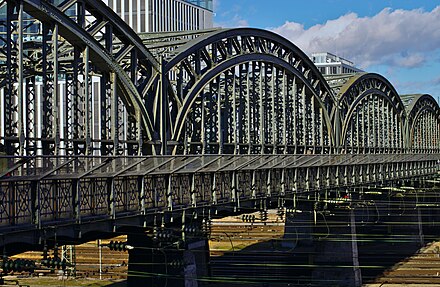 See also: Intercity buses in Germany
See also: Intercity buses in Germany
Buses are less expensive than train but usually slower, though from Prague bus is quicker. The main operator is Flixbus, others are Blablabus, Pinkbus, Eurolines and Sindbad. Buses run several times a day from Berlin (10 hr), Zürich (5 hr), Cologne (9 hr), Frankfurt (6 hr) and Hamburg (14 hr).
Munich Central Bus Station (ZOB), 48.142°, 11.550°. This is only 500 m west of Hauptbahnhof, though it feels like more lugging bags in the darkness and sleet. Signage is clear, and security and cleanliness are reasonable. There are ticket offices for individual bus lines (but no travel agency), cafes, an ATM and a supermarket. Left luggage is €3 for a small bag, €4 for a medium and €6 for a large. Trams and buses run along Arnulfstraße 100 m north. 2022-11-30
Get around
The innermost city is walkable and the outer fringes are suitable for a car. For everything else use the excellent public transport system.
By public transport
This is an integrated system where one ticket is valid for interchanges across all modes of transport. Check the Munich MVV website for network maps, fare zones and prices, timetables, journey planner and P&R parking lots.
S-bahn suburban trains (look for a white "S" on a green background) bring you from the airport to city centre. All lines run east-west through Hauptbahnhof, Altstadt and Ostbahnhof then fan out, looking like the force field around a bar magnet. The central tunnel (Stammstrecke) suffers line congestion and a second tunnel is under construction, with some upheaval along its route.
U-Bahn underground lines are signed with a white "U" on a blue background. They are the way to go north-south, for instance to the University and Kunstareal art districts, Olympiapark and Allianz Arena. They also run east to Messe trade fair halls.
Trams circle the inner city and are the way to reach Nymphenburg Palace. They're a good option east of the river, where Max-Weber-Platz is a secondary hub.
Buses connect the spaces between rail and tram routes so they're more useful in the outer suburbs. Most visitors won't use them.
Which ticket? is a question of single versus day (or longer) ticket, one rider versus group ticket, and how many zones.

A single trip in the M city centre zone from Dec 2022 costs €3.70 adult. You must validate your ticket before travel - the machine may do so automatically. It's valid for an hour but not for return, even if you found the place closed and turned straight back. A second single to come back works out slightly cheaper than a day ticket, but you may need to factor in your change in coins, see below. Virtually every attraction described on these pages is within M zone, but from the airport you need a five zone ticket for €13. Children aged 6-14 have a flat fare of €1.90 for anywhere in the system, accompanied under-6s ride free, and see MVV website for discounts for 15-20 year olds.
A day ticket is automatically validated from the time of issue to 06:00 next morning. M zone costs €8.80, from the airport it's €14.80, for children anywhere it's €3.30.
For two to five adults buy a "group" ticket; two children aged 6-14 count as one adult. The M zone group day ticket is €17 and from the airport is €27.80 - the "AirportPLUS" ticket is pretty much the same thing. MVV also tout a "München Card" which includes discounts on visitor attractions, but these are €5 more than the corresponding transport-only ticket and you'll barely break even. The "CityTourCard" is similar dubious value.
There are other combinations for intermediate zones (with or without M) and for zone 6. Few travellers will use them so check the options and fares on the MVV website. See also Upper Bavaria#Get around for fare deals across the region - these can take you all the way to Austria and are excellent value.
An Isarcard valid for seven consecutive days in Zone M is €18.60, so this is a saving if you make return trips on at least three days. A one month card is also available.
.jpg/440px-DB_423_S-Bahn_Munich_S8_Herrsching-Airport_(16225832969).jpg) Buying tickets: all types can be bought at S- and U-Bahn stations and at several tram terminuses - these machines offer multiple languages, take bank cards, notes and coins and give change. At tram and bus stops without a machine, you may buy on board. Nominally those machines likewise issue all tickets, but they only take coins, and you might not have 17 euro weighing down your pockets. Factor this in if your first journey of the day is likely to be from an outlying hotel.
Buying tickets: all types can be bought at S- and U-Bahn stations and at several tram terminuses - these machines offer multiple languages, take bank cards, notes and coins and give change. At tram and bus stops without a machine, you may buy on board. Nominally those machines likewise issue all tickets, but they only take coins, and you might not have 17 euro weighing down your pockets. Factor this in if your first journey of the day is likely to be from an outlying hotel.
One workaround is a mobile ticket. You need to register with MVV, then buy the ticket on your phone and show it as required.
Another is the blue strip card (Streifenkarte), with 10 strips. Adults use two strips per zone travelled, those aged 15-20 use one per zone, and those aged 6-14 need only one strip regardless of zones. Ten strips cost €16.30 so that's €3.20 for a single adult ride.
Kurzstrecke is yet another workaround: a short-trip ticket valid for a maximum of four stops, by any mode but with a maximum of two stages by U- or S-Bahn. These cost €1.90, enough to reach a station with a sensible machine. For instance they would get you from Maxmonument (which lacks machines) to Ostbahnhof but not Hauptbahnhof. But you could also walk 5 min to Lehel U-Bahn station and buy there, even if your journey wasn't by U-Bahn.
Validate your ticket, or check that the machine has already done so, or you risk a fine of €60. Validator machines (Entwerter) are at the entrance to S- and U-Bahn platforms, and inside buses and trams.
At night means from 02:00 to 05:00. On Friday (evening gone) and Saturday, and the Sunday before a public holiday, the S-Bahn lines all make an extra run before 03:00. The only train through the night is S8 from the airport - all U-Bahn lines close down, and all other S-Bahns including S1.
Night trams and buses run hourly. It's quite an extensive network, but you'll want to get the times from MVV before you leave the warm bar for a chilly tram stop. For example buses N40, N41 and N45 go north through the university district, and N74 runs to Messe. Trams N17 and N19 cross city centre similar to their daytime route. There are no special night fares, but day tickets expire at 06:00.
By bike
 Munich has over 200 km of cycleways, and this is a good way to explore the English Garden, riverbank and leafy outer districts. Cycle considerately - the police will fine you for flouting traffic rules, such as cycling without lights at night, or jumping traffic lights. Drunk cycling could get you jailed.
Munich has over 200 km of cycleways, and this is a good way to explore the English Garden, riverbank and leafy outer districts. Cycle considerately - the police will fine you for flouting traffic rules, such as cycling without lights at night, or jumping traffic lights. Drunk cycling could get you jailed.
MVV the city public transport combine has a bike-share scheme with multiple rental stations. Call a Bike is a similar service by Deutsche Bahn. You need to register before you can use either, and a phone app is required to unlock a bicycle. The services are convenient, as you can spot an available bike throughout the city and just leave it at your destination. Prices are comparable to public transport for short distances. In 2022 the rental is capped at €12 for MVG and €9 for DB for a full day.
Bike rental shops are Pedalhelden at Hauptbahhof and Life Food Bike (dead link: January 2023) at Landshuter Allee,
Mike's Bike Tours at Marienplatz lead bicycle tours but don't do individual rentals. The "floating" services of Donkey Republic and Nextbike no longer cover Munich.
By taxi
Taxis are beige with a yellow-black sign on the roof. There are taxi stands throughout the city, at railway and bus stations and at the airport. The central phone number for city cabs is +49 89 21610 or +49 89 19410. You can flag down a taxi - the yellow sign is lit if it's available.
Taxi fares are set by the city government. As of 2022, flagfall is €5.50 plus €2.30 per km up to 15.9 km. There is no extra charge for standard luggage (including strollers, but excluding bulky stuff like skis and surfboards) or at night. There are fixed prices for airport trips, see above.
Uber is available in Munich, but only licensed taxi-drivers may operate, and there is no price difference from standard taxis.
By car
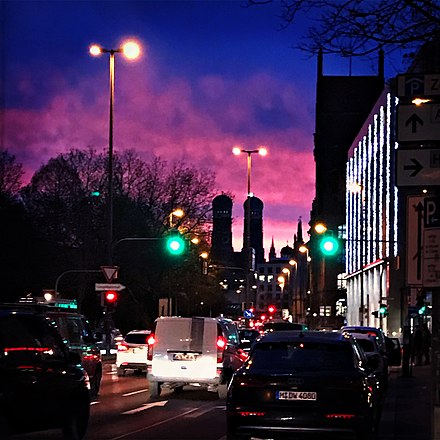 Munich has heavy traffic in rush hour, vehicles are prohibited in the historic centre, and parking within the inner ring road is reserved for residents. The system is positively designed to discourage vehicles. About the only attractions which you might visit by car are Nymphenburg Palace, Filmstadt theme park and Messe - these are all some way out of the centre with visitor car parks.
Munich has heavy traffic in rush hour, vehicles are prohibited in the historic centre, and parking within the inner ring road is reserved for residents. The system is positively designed to discourage vehicles. About the only attractions which you might visit by car are Nymphenburg Palace, Filmstadt theme park and Messe - these are all some way out of the centre with visitor car parks.
There are some 20 Park & Ride lots around the ring roads and the avenue into the university quarter. These are your best option for a day trip; charges are notional, you pay for the S- or U-Bahn ride.
Parking
Prices for parking on streets range from €1 to €2.50 per hour, usually from 08:00 to 23:00. There may be additional restrictions, e.g. for the maximum duration. Throughout the city centre there are "blue zones". Wherever you find blue lines on the ground, you can park your car for a maximum time of 2 hours (hourly rate €2.50). The meaning of other colours is as follows:
- dotted blue line—space for disabled drivers. You will need a special permit in your car which indicates that you are allowed to park in those areas.
- yellow line—reserved for taxis, do not park here.
- red line—never park here, not even for a short time since it is strictly forbidden and may likely result immediate towing.
- orange line—reserved for deliveries, do not park here.
The best options are public parking decks which are widely available in the centre. However it can take some time to find a free parking spot. Parking garages are indicated with blue rectangular signs with a capital white "P". Usually a green sign indicates that there are free spots while a red sign indicates that the car park is full. The city has a car park routing system which shows you where you can find a parking slot. Rates are:
- from €2–6 per hour (most will charge around €3 per hour)
- from €8–30 per day (most will charge €15–20 per day)
- some may even offer monthly rates, expect €100 per month minimum
Outside the historic city centre (where the colour scheme isn't used), parking along the streets is mostly only allowed for residents with a special parking permit.
Towing
The police may tow your car away if it obstructs the traffic or endangers other people. Watch out for fire brigade access roads which are marked with small signs reading "Feuerwehrzufahrt". There is no stopping and standing, parking will result in immediate towing.
If your car has been towed away contact the next available police station. There is a central place where all towed cars will be brought to (Thomas-Hauser Straße 19; open 24/7; S2/S4 to station Berg am Laim, Bus 146 to Iltisstraße until stop Thomas-Hauser Straße, 5 min to walk from there). You need to show your passport/ID, drivers licence and registration document and you will have to pay a fine—expect around €150.
A constant harassment are the private towing companies that guard private parking spaces such as those of supermarkets. Their fines can easily double or triple the police's fines.
See
Stately avenues
Four royal avenues were laid out in the 19th century, with imposing architecture.
Briennerstraße starts at Odeonsplatz (where you can find Feldherrnhalle, Theatinerkirche and the Residenz) on the northern fringe of Altstadt. It runs east to west past Wittelsbacherplatz (with Alfons-Palais and the statue of Maximilian I), Karolinenplatz (the black obelisk honours the Bavarian Army), to Königsplatz. This is Athens-on-the-Isar, with the Doric Propylaea, the Ionic Glyptothek and the Corinthian State Museum of Classical Art. The east end of Briennerstraße is lined with upscale shops, galleries, cafés and restaurants.
Ludwigstraße runs north from Odeonsplatz through Maxvorstadt into Schwabing. It's lined by Italian Renaissance and Neo-Romanesque buildings, such as St Ludwig's Church and the main campus of the University of Munich (LMU). Ludwigstraße ends at Siegestor, a triumphal arch crowned with a statue of Bavaria with a quadriga of lions, but the avenue continues north as Leopoldstraße.
Maximilianstraße starts at Max-Joseph-Platz by the Residenz and National Theatre, and runs east across the river Isar to end at Maximilianeum, the Bavarian state parliament. The avenue is framed by neo-Gothic buildings with a hint of English Perpendicular. Its west end together with Residenzstraße has Munich's most upscale shopping and hotels.
Prinzregentenstraße runs parallel 500 m north of Maximilianstraße from Prinz-Carl-Palais. Museums along it are Haus der Kunst, the Bavarian National Museum and Schackgalerie. It forms the southern boundary of English Garden, where the Eisbach is one of the world's most unlikely surfing spots. The avenue crosses the Isar, circles the Friedensengel monument, and on the east bank passes Villa Stuck.
Museums, galleries and palaces
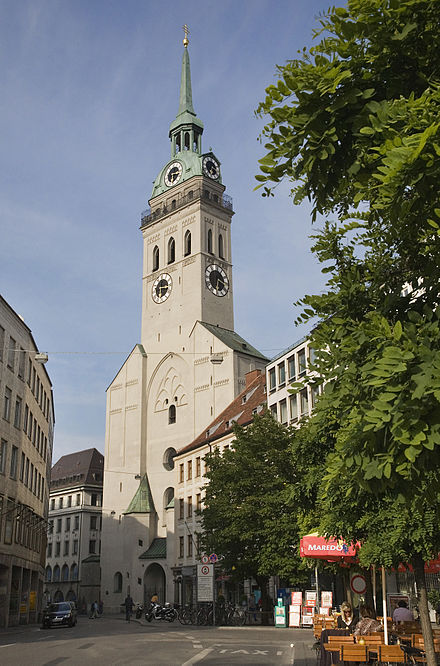
- Many sites are closed Monday, and charge only €1 on Sunday, but check individual places for exceptions to this.
- Kunstareal in Maxvorstadt is the fabulous result of Bavarian kings' project to transform Munich into Germany's art capital in the 19th century. This art quarter hosts some 16 museums (including the three famous Pinakotheken), 40 galleries and 7 art schools. Neue Pinakothek is closed until 2025.
- Altstadt the historic city centre is itself a museum piece. Münchner Stadtmuseum and the Jewish Museum are in Altstadt with more on the north fringe of Lehel, such as the Residenz, Haus der Kunst and Bayerisches Nationalmuseum.
- Deutsches Museum of science and technology occupies an entire river island in Isarvorstadt. It has branches for transport near Bavariapark and for aviation in Oberschleißheim north of the city. The MVG transport museum is in the east.
- BMW Museum, documenting the history of the famous car manufacturer, is in the north of the city.
- "Bling palaces" were built from the 17th to the 19th century for luxury and show not for defence. Some have found modern uses, but those you can tour include the Residenz in Altstadt, Schloss Nymphenburg (the standout) and Schloss Schleißheim in the north, and Dachau further north.
Churches
Churches, cathedrals and other religious sites are among Munich's oldest structures, but also some of its newest.
- Aldstadt has many, top examples are Frauenkirche, Peterskirche, Asamkirche, Theatinerkirche, Michaelskirche and Ohel Jakov synagogue.
- Other notable churches in the inner city districts are St Boniface and St Benno in Maxvorstadt, St Nikolai in Haidhausen, St Paul and St Maximilian in Ludwigsvorstadt, St Ursula and St Sylvester in Schwabing, Herz Jesu in Nymphenburg and the royal chapel within Nymphenburg palace.
- Further out see the Templar monastery in the east city, and Heilig-Kreuz-Kirche plus its half-buried artistic replica north near Allianz Arena.
- Mosques: there's about a dozen, mostly in the suburbs. They're modern and fairly plain, so they're places for praying in rather than looking round.
Architecture
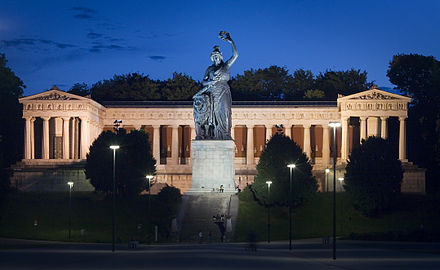 Munich was heavily bombed in 1944/45, so its "old" buildings are reconstructions, only with better utilities plumbed in.
Munich was heavily bombed in 1944/45, so its "old" buildings are reconstructions, only with better utilities plumbed in.
Altstadt is the medieval core, and Frauenkirche with its twin "salt and pepper shaker" towers defines the Munich skyline - no structure may be built higher. The other churches and the old and new town halls are top sights.
Grand 19th century neo-classical buildings line the royal avenues described earlier: these start on the north fringe of Altstadt, heading into Maxvorstadt or east across Lehel.
The 1960s and 1970s threw up a lot of mediocrity buildings, but those that catch the eye are the Olympiastadium, high-rises such as the Hypo-Haus, the BMW-Vierzylinder and the Arabellahaus, and several U-Bahn stations.
Notable contemporary architecture includes BMW Welt (2007) in the north of the city, Museum Brandhorst in Maxvorstadt (2009), and Ohel-Jakob-Synagoge (2006) in Altstadt. Mae West would be astounded to hear that the 2011 sculpture in Arabellaplatz was intended to resemble her.
Parks
.jpg/440px-M%C3%BCnchen,_englischer_Garten,_Der_Monopteros_im_letzten_Licht_der_Mittsommernacht_--_Munich,_English_Garden,_The_monopteros_in_the_last_light_of_the_midsummer_night_(14292865008).jpg)
- English Garden in the north city is charming. Its southern portion, easily reached from Lehel or University districts, is ornamented, with the Chinese Tower and beer gardens. Its northern "Hirschau" portion is woodland and grazing.
- Olympia Park in the northwest was created for the 1972 Olympic Games.
- Westpark in the southwest was created for a 1983 garden exhibition, and retains some pavilions from then.
- Cemeteries contain notable monuments, and famous and infamous city residents. Perhaps the most interesting is Alter Südfriedhof (Old South Cemetery) in Ludwigsvorstadt, created to hold medieval plague victims.
- Wildlife reserves include Perlacher Forst a woodland to the southeast and Fröttmaninger heath in the north.
Do

Events
- St Patricks's Day is on 17 March, but in Munich is held over the nearest weekend, with parades and a street festival. Locations vary but parades are likely to be around Odeonsplatz in Altstadt and Münchner Freiheit further north.
- May Day is a public holiday in Germany. Many Bavarian villages erect maypoles, gussy up in Lederhosn and Dirndln, and cavort to the tunes of oompah bands. Locations vary but in Munich city the likeliest spot is Viktualienmarkt south of Town Hall.
- Lange Nacht der Musik is an all-night event in May, with 400 concerts and other musical events, and shuttle buses between venues.
- Tollwood organise two extended music festivals: June-July in Olympic Park in northern Munich, and Nov-Dec (with a Christmas market) on the Wies'n site in Ludwigsvorstadt.
- Corso Leopold is a street fair taking over a km of Leopoldstraße in north Munich, traditionally in June and September. Streetlife Festival was its southern extension along Ludwigstraße, but as of 2022 this hasn't resumed post-Covid.
- Theatron Pfingsfestival is a music festival in Olympiapark in June, with the stage on a platform on the lake. Theatron also organise Musiksomer here in August.
- Christopher Street Day is a Rainbow Pride or LGBTQ+ event, held over two weeks in June. It's named for Christopher Street in Greenwich Manhattan, scene of the 1969 Stonewall uprising against police oppression. Multiple venues, the big parade is around Marienplatz in Altstadt.
- Münchner Sommernachtstraum (Midsummer Night's Dream) is a music festival with fireworks on Olympiapark in July.
- Kocherlball ("Cooks' Ball") is held by the Chinese Tower in English Garden in July. 19th century servants were briefly allowed out to party, but they had to be back on duty by midday, so it's held from 06:00 to 10:00. Many dance in old costume.
- Impark is held on Olympia Park in August. It's a mixture of fairground, live music and sports events.
- Isarinselfest (Isar island festival) is a street fair along the river bank in Lehel on a September weekend.
- Oktoberfest is the world's largest beer festival, held from mid-September to the first Sunday in October. Known locally as Wies'n, it's held on Theresienwiese, a huge meadow 1.5 km west of Altstadt in the district of Ludwigsvorstadt
- Electronic Music Festivals: Munich is a hotspot for rave and electronic dance music in Germany. Events in or near the city include Isle of Summer, Greenfields, Back to the Woods, Schall im Schilf, Wannda Circus Open Air, Contact Festival and EOS Festival.
Theatre, opera and music
- Theatres are mostly in Altstadt, Ludwigsvorstadt-Isarvorstadt and Maxvorstadt. Plays are almost always in German, while opera, ballet and music transcend language.
- Gasteig arts centre on the east riverbank is closed for rebuilding until 2027. The Philharmonic Orchestra and other residents have moved to HP8, a temporary home in Sendling.
- Cinema: foreign movies are normally dubbed with German voices. Adverts will indicate OF if the movie is in its original version with no overdubbing, OmU for original with German subtitles, and OmeU for original with English subtitles. "Cinema" movie theatre by Stiglmaierplatz shows all movies in their original language. Museum Lichtspiele in Haidhausen and the multiplex Mathäser at Stachus often show movies in their original version.
Sport
- Surfing is obviously what draws you to Munich. There are four spots, the best is where the Eisbach flows into the English Garden, see Munich/North#Do.
- Swimming is possible in the river Isar, in several artificial lakes around the edge of the city, and in the indoor and outdoor pools operated by SWM.
- Football: FC Bayern Munich play soccer in Bundesliga, Germany's top tier. Their home ground is Allianz Arena to the north in Fröttmaning.
Munich's other team, TSV 1860, now languish in 3. Liga, the third tier. They play at Grünwalder Stadion 3 km south of the centre in Haidhausen.
- Basketball: FC Bayern Munich, not content with soccer, also play basketball at the Audi Dome in Westpark, southwest Munich.
- Ice Hockey: the pro hockey club is EHC Red Bull München. They play at the ice arena in Olympic Park.
Learn
Munich is a leading centre for science and research, with a long list of Nobel laureates, from Wilhelm Conrad Röntgen in 1901 to Theodor Hänsch in 2005. It hosts two world-class research universities (both with main campuses in Maxvorstadt), several colleges, and the headquarters and research facilities of the Max-Planck and Fraunhofer Societies. Ludwig Maximilians University (LMU) is considered one of Germany's best universities, and the Technical University of Munich (TUM) is renowned for its science and engineering.
- Speakeasy München, Sonnenstraße 16 (S- & U-Bahn: Sendlinger Tor), +49 89 444 433630. A spin-off from the Goethe Institute, this offers intensive entry-level courses in German. 2022-12-01
- Deutschkurse bei der Universität München e.V., Adelheidstraße 13b (U-Bahn: Josephsplatz), +49 89 244 10490, info@dkfa.de. Associated with LMU, this school provides longer German language courses for foreigners. This is an ideal preparation for other courses run in German. 2022-12-01
Buy

Shopping districts
Most city-centre stores open M-Sa 09:30-20:00, with those further out closing by 18:00. See district pages for individual stores.
- Maximilianstraße / Residenzstraße / Theatinerstraße (U-Bahn: Odeonsplatz or Marienplatz) in Altstadt have high end luxury goods.
- Kaufingerstraße / Neuhauser Straße (S- & U-Bahn: Karlsplatz (Stachus) or Marienplatz) is a pedestrian zone in Altstadt. It's the main area for mid-priced goods, with department stores, chains and a few independents. As it's close to the station, it gets crowded during the evening rush hour.
- Hohenzollernstraße (U-Bahn U2: Hohenzollernstraße) is in northern Munich. It has a collection of clothes shops, which sell reasonably-priced traditional Lederhosn and Dirndl. East end of this street is Leopoldstraße.
- Leopoldstraße (U-Bahn U3, U6: Münchner Freiheit, Giselastraße or Universität) is a busy boulevard in the university district. It has chain stores, fast food joints, budget restaurants, cinemas, sidewalk cafes and coffee shops. Boutiques and independents are down the side streets, and on summer evenings local artists display their works.
- Schellingstraße (U-Bahn U3, U6: Universität) west of the university main campuses offers everything studenty, such as clothes, small book stores, cafés and of course cheap eats.
- Gärtnerplatz (U-Bahn U2: Fraunhoferstraße) south of Altstadt is the place for antiques, crafts and other quirky wares.
Markets
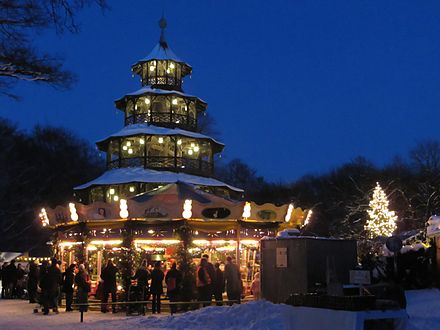
-
Wochenmarkt means weekly markets, with an emphasis on fresh food, often called "Farmers' markets". There are several across the city: Viktualienmarkt in Altstadt and Elisabethmarkt in Schwabing are open M-Sa.
-
Christmas markets (Weihnachtsmarkt or Christkindlmärkt) are held in the four weeks of Advent up to Christmas Eve, offering as much mulled wine, sausage and wood-carved knick-knacks as you can handle. They're typically open daily 12:00 to 20:00. The biggest and most touristy is in Marienplatz in Altstadt, spilling down Viktualienmarkt and Rindermarkt. At the north boundary of Altstadt with Maxvorstadt, the market on Wittelsbacher Platz is medieval-themed. Others are by the Chinese Tower in English Garden, and in Schwabing at Münchner Freiheit. Smaller events further out involve the year-round food market acquiring extra booths selling specialty items for Christmas. In previous years an antique "Christmas tram" toured the edge of Altstadt between Sendlinger Tor and Marienplatz, but this has not resumed post-Covid.
-
Flohmarkt means Flea Market. They're typically on a weekend, with private citizens selling their surplus belongings with few commercial traders. Some of these blend into local fairs and festivities. The largest examples are Auer Dult three times a year in Haidhausen, Theresienwiese in spring on the Oktoberfest site in Ludwigsvorstadt, and on Olympiapark in the north.
-
Hofflohmärkte are a German specialty: "courtyard markets" where residents open their private courtyards, often with several in a neighbourhood combining with a street flea-market. They're held nation-wide with a score of locations in Munich alone, see website for details. Schloss Nymphenburg has bragging rights for the fanciest setting.
Eat
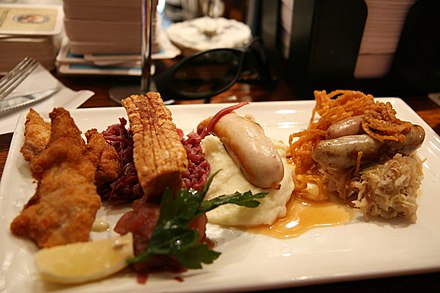
- Bavarian cuisine is obviously the main offering, majoring on sausages and other pork. Munich specialities are Weißwurst (a breakfast sausage served until noon and not a second later, washed down with Weissbier), Schweinsbraten (roasted pork) or Schweinshaxe (roasted pig's knuckle). Other trad dishes such as schnitzel are popular but not specifically Bavarian. Beer gardens and beer halls serve heaps of all these.
- Leberkässemmeln is a white roll filled with a thick warm slice of "Leberkäse" — which, despite its name, contains neither liver nor cheese. It's a mix of veal, pork, spices and a hint of lemon zest baked in an open pan and served with a sweet and grainy mustard. Buy these filling, inexpensive snacks at butchers rather than bakers.
- Bavarian / Austrian cakes and tortes can be bought by the slice at countless bakeries and cafés. There's also a great array of bread: one local snack is soft pretzels, "Brezn".
- International cuisines are widely available, especially Italian, with a strong showing also of Chinese, Turkish and Japanese.
- Vegetarian, vegan and GF food is found in many restaurants, and there are specialist vegetarian cafes.
- Bakeries sell bread, pastries, sandwiches, salads and sometimes broader offerings such as soup. One Munich-only bakery chain is Rischart.
- See "Buy" above for fresh and seasonal food markets.
Drink
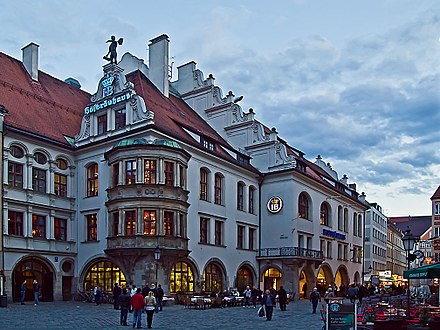
- Oktoberfest is the huge event held over 16-17 days in Theresienwiese in Ludwigsvorstadt. You need to feel comfortable in dense crowds.
- Beer halls serve the product of a particular brewery and are often within their historic brewing and cellar premises, cleared when production moved elsewhere. Concentrated in Altstadt, there's typically a ground-floor "brown table" area, an upstairs swankier "white table" restaurant, and suites for events and functions. Outside if space permits is a beer garden. The beer hall which launched the infamous Munich putsch of 1923 has been demolished.
- Beer gardens may be summer-only but several are year-round, albeit weather-dependent. They may be self- or table-service, and all serve traditional meals or snacks such Riesenbrezn (big pretzels) and Steckerlfisch (cured fish). You're allowed to bring your own food but not drink. Drinks are typically litre mugs (Maß) of beer or of Radler, a shandy of beer and lemonade. Beer gardens are family-friendly (with play areas within parental sight) and diverse, welcoming a motley crowd including well-behaved dogs. There are over two dozen around the city, good examples being Hofbräuhaus in Altstadt (very touristy), Viktualienmarkt in Altstadt (with beer from all the major breweries), Chinese Tower in English Garden, Paulaner and Bavariapark in Ludwigsvorstadt, and Löwenbräukeller and Augustiner in Maxvorstadt. Paulaner am Nockherberg in Haidhausen hosts a strong beer festival in March.
- Bars number over a thousand, so you can but make a start. Some oddities worth seeking out are Goldene Bar in Lehel, Minna Thiel (with a DJ in an old railbus) and Bar Sehnsucht in Maxvorstadt, Cronlein (in a former rest room) and CCC Container Collective in Haidhausen, and Alte Utting (a lake steamer perched on railway tracks) in Ludwigsvorstadt.
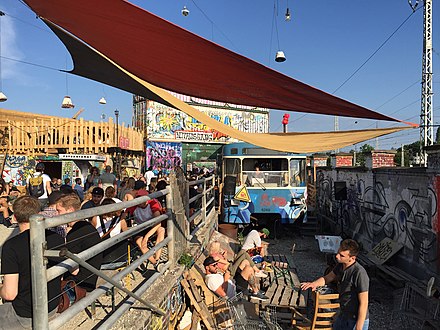
- Clubs and discos of Munich have launched many a famous name. In the 1990s the city became a centre for rave and techno. You need photo-ID to get in: 18 is the standard minimum age but some insist on 25-30. Dress codes are casual. Popular nightlife districts are Altstadt-Lehel, Maxvorstadt, Ludwigsvorstadt-Isarvorstadt and Haidhausen - the latter includes the industrial-scale Werksviertel entertainment complex. See Cope for local listing services and Do for music festivals.
- Techno clubs include Blitz Club, Harry Klein, Rote Sonne, Bahnwärter Thiel, Grinsekatze, Pimpernel, Charlie and Palais.
- Mixed programs of Electro, House, Indie, Rock and Hip-Hop are at Call Me Drella, Kauz, Wannda Circus, Minna Thiel, Backstage (dead link: January 2023), 8 below, Tonhalle, Pathos, Muffatwerk, Ampere, and the party ship Alte Utting.
- Upscale clubs for a wealthy audience are Pacha Munich and P1.
Sleep
Camping: there are four regular sites around the city fringes.
The Hauptbahnhof area has the densest concentration of accommodation, with hostels, budget hotels (not all of them vice-dens) and upscale hotels like Le Meridien and Sofitel. There is major construction here until 2027, so expect some noise, mud and street disruption.
The other main areas for budget to mid-range are Schwabing and the university quarter, and around Ostbahnhof. They hike their prices in summer, during trade fairs at Messe, and of course during Oktoberfest. Prices drop as you move further out along the S- and U-Bahn routes, but all are within the same inner city fare zone.
Upscale accommodation is close to Altstadt but there's little within the medieval centre, which is cunningly designed to keep out taxis and hire cars. The best is along its northeast edge in Lehel.
Oktoberfest (last two weeks in September) jam-packs not only Munich in all price ranges, but everywhere within an hour or two travel time, if only you could find room on the overcrowded trains. There are several pop-up campsites around the city edges, look especially in east and southwest districts. Visitors not aiming for the beerfest should come another time.
Stay safe
Boasting one of the lowest crime rates of any major European city, Munich is a very safe city for residents and travelers alike, and violent crime is rare. Walking around, day or night, is not an issue, and you will most likely not encounter any crime at all, though you should still take the usual precautions against pickpocketing (especially in the central districts of Altstadt-Lehel and the Ludwigsvorstadt area immediately south of the central station), such as not leaving your camera unattended or venturing alone through parks at night. While some of Munich's boroughs like Neuperlach and Hasenbergl have a reputation for seediness among locals, crime levels are actually average.
Munich is an open-minded, international city with a large number of immigrants and expatriates living in the city (almost 40% of residents have a foreign origin, mostly from Turkey, the Balkans, and Poland), so you are very unlikely to encounter any problems because you are a foreigner. Gay and lesbian travelers should not experience any issues either: Munich has a large gay and lesbian community, and the Rosa Liste, a gay rights party, was part of the city government from 1996 to 2014.
A safety hazard in Munich is the local beer-drinking culture in combination with the high accessibility of alcohol. Think twice before trying to keep up with the locals or looking for your maximum level of alcohol intoxication - being drunk will sharply raise your chances of injuring yourself. You should also keep your distance if you see drunk people fighting, such as in the bars around the central station. Of course, heavy drinking at the time of Oktoberfest will inevitably make people lose control and result in some violent behaviour. Another issue for people not used to driving or walking on ice or snow is wintry road and sidewalk conditions.
If you've been to other major cities outside Bavaria before the encounters with the Munich police might be a bit of a culture shock, who mostly follow the "law and order" ideas of the regional politics here. Don't be surprised that minor infractions that could slide in Berlin will often get you into hot water with the Munich police. On the whole however they are helpful and there to make people feel safer and corruption is nearly unheard of.
Stay healthy

The emergency telephone number in Munich is 112 (like everywhere in the EU), which will connect you to emergency medical services, police, or fire brigade. The emergency telephone number 110 (Germany only) will connect you directly to the police. All major hospitals have emergency rooms (Notaufnahme) that offer 24/7 medical assistance not only to patients brought in by ambulance but to walk-in customers as well. Waiting time might be lengthy if you are not considered an emergency case.
- Bereitschaftspraxis Elisenhof, Elisenstraße 3 (Near the main station Hauptbahnhof), +49 89 116-117. M–F 19:00–23:00, Sa Su 08:00–23:00. For non-serious illnesses, the GPs association provides an after-hours doctor's office near the main station that receives patients without prior appointment until 23:00 every day of the week including weekends.
- Deutsches Herzzentrum München (German Cardiac Center Munich), Lazarettstraße 36 (U-Bahn U1, U7: Maillingerstraße), +49 89 12180. The hospital was founded in 1974 as the first cardiac center in Europe.
- Klinikum Großhadern (university hospital), Marchioninistraße 15 (U-Bahn U6: Großhadern), +49 89 70950. The university hospital of the University of Munich (LMU). The staff is able to converse in English fluently and is also prepared to deal with non-English-speaking patients.
- Klinikum Rechts der Isar (university hospital), Ismaninger Straße 22 (U-Bahn U4, U5: Max-Weber Platz), +49 89 41400. The university hospital of the Technical University of Munich (TUM). The staff is able to converse in English fluently and is also prepared to deal with non-English-speaking patients, with a special focus on guests from Arabic countries.
- Klinikum Schwabing (pediatric clinic), Kölner Platz 1 (U-Bahn U2, U3: Scheidplatz), +49 89 30680. The most important children's hospital in Munich.
Cope

What's going on?
Munich has an active press, and high competition leads to quality magazines.
- In München is a biweekly magazine listing upcoming events in and around Munich.
- Münchner Merkur is a conservative daily newspaper with high readership.
- Süddeutsche Zeitung is a German institution, the country's preeminent newspaper, and a good source of information for Bavarian general news and cultural events.
- tz is the city's main tabloid, so read it for sports and popular entertainment, not the latest on the orchestra relocation.
- TAG24 is a national tabloid news website with pages for 11 cities including Munich.
- München Wiki is the city's own open-source wiki, with over 15,000 articles. It's only in German but carries a wealth of information on restaurants, nightlife, current events and festivals, arts and culture, leisure activities and the history of Munich. The style more resembles Wikipedia than Wikivoyage, and as with any page of that nature, you need to look at when the info was last updated.
Consulates
Always start by checking the embassy website - something like a lost passport will be handled from there or even from the home country rather than the local consulate. This section doesn't list Honorary Consuls, who will express sympathy at your predicament but advise you to call the embassy in Berlin.
Public laundromat
Wash & Coffee is a public laundromat in where you can either stick around for the entire duration of your laundry cycle (free internet and a coffee bar, and many English-speaking customers will keep you occupied), or you can purchase their services for doing the laundry. They have laundry detergent for sale, so you don't need to pick that up. They are within walking distance of the Isartor S-bahn station. They are closed on Thursdays.
Go next
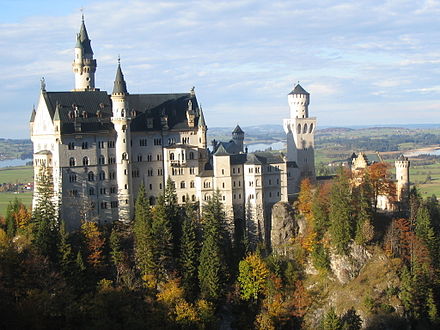 All of Germany is within easy reach of Munich, for instance Cologne takes 4½ hours and Berlin takes 5½ hours by ICE train. The destinations outlined below are a selection of those within a journey of an hour or two, well within a day-trip from Munich: see Upper Bavaria for more. See individual "Get in " pages for practicalities, but train is quickest, and the Bayern-Ticket is a bargain deal for day trips across the region.
All of Germany is within easy reach of Munich, for instance Cologne takes 4½ hours and Berlin takes 5½ hours by ICE train. The destinations outlined below are a selection of those within a journey of an hour or two, well within a day-trip from Munich: see Upper Bavaria for more. See individual "Get in " pages for practicalities, but train is quickest, and the Bayern-Ticket is a bargain deal for day trips across the region.
- Andechs has a monastery in a beautiful setting above the Ammersee, with a famous brewery and beer garden.
- Chiemsee has a large lake with a castle and a monastery on its islands.
- Dachau is best known for its concentration camp, now a museum, but also has a Renaissance palace.
- Füssen at the foot of the Alps is dominated by Neuschwanstein, the "Disney-castle" in all the tourist brochures, and equally-interesting Hohenschwangau.
- Garmisch-Partenkirchen is an Alpine resort - take the rack railway to the top of Zugspitze, Germany's highest mountain.
- Nuremberg is a medieval walled city with many outstanding museums, including coverage of the Nazi era and its downfall.
- Regensburg is a beautiful medieval city and on the Danube.
- Salzburg in Austria is a historic city with Hohensalzburg Fortress glowering above.
- Ulm, birthplace of Einstein, has a medieval centre with the world's highest church spire.
Related: Bavarian cuisine
Munich
stadt.muenchen.de/rathaus.htmlstadt.muenchen.de/en.htmlmuenchen.de/int/fr.htmlmuenchen.de/int/ru.htmlmuenchen.de/int/ar.htmlmuenchen.de/int/zh.htmlmuenchen.de/int/it.htmlstadt.muenchen.destadt-muenchen.destadtmuenchen.deUpper Bavaria
2nd-order administrative division
Bavaria
Primary administrative division
Germany
deutschland.de/enPopulation:82.9 MDial code:+49Currency:Euro (EUR)Voltage:230 V, 50 HzIEC 60309

